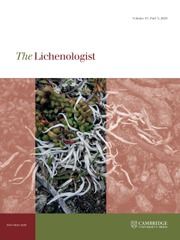Crossref Citations
This article has been cited by the following publications. This list is generated based on data provided by
Crossref.
Galloway, D. J.
1992.
Biodiversity: a lichenological perspective.
Biodiversity and Conservation,
Vol. 1,
Issue. 4,
p.
312.
Sipman, H. J. M.
1994.
Progress in Botany.
p.
288.
Nash, Thomas H.
and
Gries, Corinna
1995.
The use of lichens in atmospheric deposition studies with an emphasis on the Arctic.
Science of The Total Environment,
Vol. 160-161,
Issue. ,
p.
729.
Carignan, Jean
and
Gariépy, Clément
1995.
Isotopic composition of epiphytic lichens as a tracer of the sources of atmospheric lead emissions in southern Québec, Canada.
Geochimica et Cosmochimica Acta,
Vol. 59,
Issue. 21,
p.
4427.
Nash, Thomas H.
and
Gries, Corinna
1995.
The response of lichens to atmospheric deposition with an emphasis on the Arctic.
Science of The Total Environment,
Vol. 160-161,
Issue. ,
p.
737.
Loppi, Stefano
Cenni, Enrico
Bussotti, Filippo
and
Ferretti, Marco
1997.
Epiphytic Lichens and Tree Leaves As Biomonitors of Trace Elements Released By Geothermal Power Plants.
Chemistry and Ecology,
Vol. 14,
Issue. 1,
p.
31.
Peck, JeriLynn E.
and
McCune, Bruce
1997.
REMNANT TREES AND CANOPY LICHEN COMMUNITIES IN WESTERN OREGON: A RETROSPECTIVE APPROACH.
Ecological Applications,
Vol. 7,
Issue. 4,
p.
1181.
Benzing, David H.
1998.
Potential Impacts of Climate Change on Tropical Forest Ecosystems.
p.
379.
Sillett, Stephen C
and
Goslin, Matthew N
1999.
Distribution of epiphytic macrolichens in relation to remnant trees in a multiple-age Douglas-fir forest.
Canadian Journal of Forest Research,
Vol. 29,
Issue. 8,
p.
1204.
Conti, M.E.
and
Cecchetti, G.
2001.
Biological monitoring: lichens as bioindicators of air pollution assessment — a review.
Environmental Pollution,
Vol. 114,
Issue. 3,
p.
471.
Price, Karen
and
Hochachka, Gail
2001.
EPIPHYTIC LICHEN ABUNDANCE: EFFECTS OF STAND AGE AND COMPOSITION IN COASTAL BRITISH COLUMBIA.
Ecological Applications,
Vol. 11,
Issue. 3,
p.
904.
Garty, J.
Weissman, L.
Cohen, Y.
Karnieli, A.
and
Orlovsky, L.
2001.
Transplanted Lichens in and around the Mount Carmel National Park and the Haifa Bay Industrial Region in Israel: Physiological and Chemical Responses.
Environmental Research,
Vol. 85,
Issue. 2,
p.
159.
St. Clair, Samuel B.
St. Clair, Larry L.
Weber, Darrell J.
Mangelson, Nolan F.
and
Eggett, Dennis L.
2002.
Element Accumulation Patterns in Foliose and Fruticose Lichens from Rock and Bark Substrates in Arizona.
The Bryologist,
Vol. 105,
Issue. 3,
p.
415.
Will-Wolf, S.
Esseen, P.-A.
and
Neitlich, P.
2002.
Monitoring with Lichens — Monitoring Lichens.
p.
203.
St. Clair, Samuel B.
St. Clair, Larry L.
Mangelson, Nolan F.
and
Weber, Darrell J.
2002.
Influence of growth form on the accumulation of airborne copper by lichens.
Atmospheric Environment,
Vol. 36,
Issue. 36-37,
p.
5637.
Levia, Delphis F
and
Frost, Ethan E
2003.
A review and evaluation of stemflow literature in the hydrologic and biogeochemical cycles of forested and agricultural ecosystems.
Journal of Hydrology,
Vol. 274,
Issue. 1-4,
p.
1.
Bergamaschi, L.
Rizzio, E.
Giaveri, G.
Profumo, A.
Loppi, S.
and
Gallorini, M.
2004.
Determination of baseline element composition of lichens using samples from high elevations.
Chemosphere,
Vol. 55,
Issue. 7,
p.
933.
Ohnuki, Toshihiko
Aoyagi, Hisao
Kitatsuji, Yoshihiro
Samadfam, Mohammad
Kimura, Yasuhiko
and
William Purvis, O.
2004.
Plutonium(VI) accumulation and reduction by lichen biomass: correlation with U(VI).
Journal of Environmental Radioactivity,
Vol. 77,
Issue. 3,
p.
339.
Golubev, A.V.
Golubeva, V.N.
Krylov, N.G.
Kuznetsova, V.F.
Mavrin, S.V.
Aleinikov, А.Yu.
Hoppes, W.G.
and
Surano, K.A.
2005.
On monitoring anthropogenic airborne uranium concentrations and 235U/238U isotopic ratio by Lichen – bio-indicator technique.
Journal of Environmental Radioactivity,
Vol. 84,
Issue. 3,
p.
333.
Ra, H.S.Y.
Geiser, L.H.
and
Crang, R.F.E.
2005.
Effects of season and low-level air pollution on physiology and element content of lichens from the U.S. Pacific Northwest.
Science of The Total Environment,
Vol. 343,
Issue. 1-3,
p.
155.


